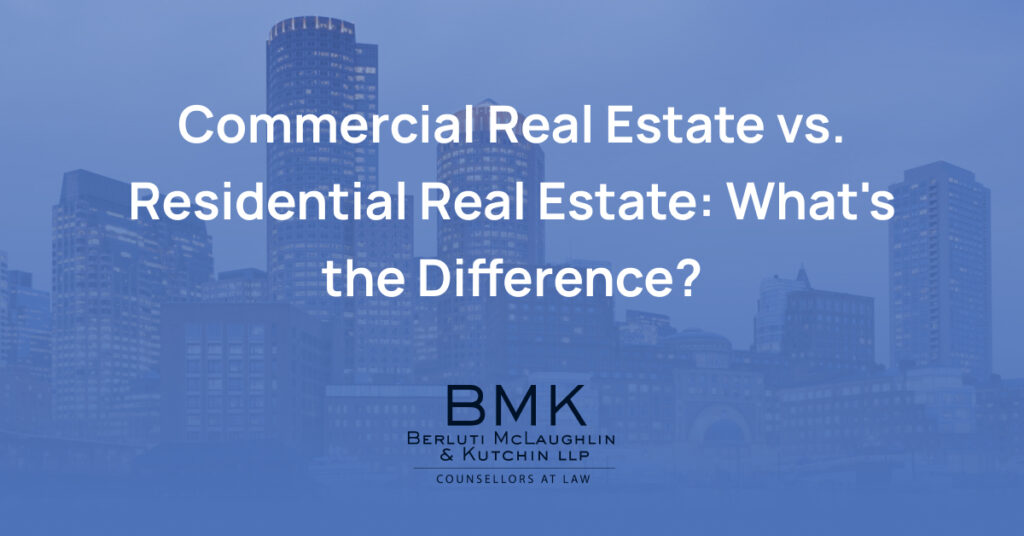
Understanding the difference between commercial real estate vs. residential real estate is paramount if you are considering buying, selling, or investing in property in Massachusetts. With a maze of regulations, financing options, and legal documents, handling these types of transactions can become complicated quickly. An experienced legal professional who knows the main differences can help you select the right property or investment for your needs.
Key Takeaways
- Commercial real estate (CRE) is designed for business use, such as offices, retail spaces, and multi-unit complexes, while residential real estate (RRE) is intended for people to live in, including houses, condos, and apartments.
- Key differences include leases, financing, taxes, and regulations: commercial leases are more complex and negotiable, loans are stricter with higher costs, tax rates are higher, and environmental rules are stricter than for residential properties.
- Investment considerations differ: commercial properties offer higher income potential but require larger upfront investments and expertise, while residential properties are more accessible, lower risk, and often easier to finance.
- Legal guidance is essential, as both types of transactions involve complex laws, contracts, and due diligence that can impact your financial outcome and rights.
What Is Commercial Real Estate?
Commercial real estate (CRE) is property used for business or investing purposes or as a workspace instead of a living space. CRE is almost always for income-generating operations but could also be a personal investment. Commercial real estate (CRE) refers to properties used solely for business, including malls, offices, dormitories, and senior living communities. Residential real estate includes homes, condos, and townhouses. These properties are often in downtown areas and major transportation hubs like Boston. They are also frequently larger than residential properties.
CRE is usually more stable and liquid than residential real estate because it is easier to sell. However, because of the higher demand for space that can be sold or rented, CRE is also typically more expensive than residential real estate.
What Is Residential Real Estate?
Residential real estate (RRE) is property designed and zoned for people to live in. RRE property has structures made for habitation instead of commercial or industrial use. There are many different housing types, such as:
- Single-family homes,
- Multi-family homes,
- Apartments,
- Condominiums (condos),
- Townhouses,
- Mobile homes, and
- Vacation homes.
Residential real estate refers to properties used for housing, including both land and buildings. This contrasts with commercial or industrial real estate, which is zoned for business operations such as offices, factories, or stores.
RRE properties are commonly smaller than commercial properties in suburban, rural, or residential neighborhoods. They are an essential part of the broader real estate market and can be purchased, sold, rented, or leased. They can serve as a personal residence or investment property.
Is a Condo Residential or Commercial?
A condo is an individually owned residential unit in a building or complex of similar units.
What Are the Differences Between Commercial vs. Residential Real Estate?
The main difference between residential and commercial property is purpose: residential property is for living (houses, apartments), while commercial property is for business (offices, stores). Commercial properties involve higher costs, longer leases, and different regulations compared to residential ones. CRE is primarily for business operations and is often subject to longer lease terms, stricter regulations, and higher property taxes. Residential properties typically have simpler lease structures and fewer legal restrictions.
Choose commercial real estate for higher profit but expect higher costs and expertise. Use residential rentals for lower risk and easier entry. Align investment strategy with your goals and financial position.
Commercial properties lease to businesses or apartment complexes with five or more units. Residential properties include single-family homes, duplexes, triplexes, or apartments with four or fewer units where people live.
Let’s look at a few other key differences.
Leases
Residential leases in Massachusetts are legal contracts between landlords and tenants who occupy the property. They have many built-in statutory protections and standardized leasing practices to safeguard the tenants. Lease agreement terms include rent, security deposits, eviction procedures, maintenance responsibilities, and habitability standards. State laws heavily protect tenants to ensure fair treatment.
Commercial leases are contracts between a landlord and a business tenant. They tend to be more sophisticated, complex, and negotiable. The parties can tailor the terms and conditions of the agreement to their specific needs. They are expected to conduct thorough due diligence and are held to higher contractual obligations than residential leases.
Commercial leases typically cover rent escalations, lease duration, maintenance, build-out responsibilities, financing, and insurance. They are also generally subject to fewer statutory regulations because business tenants are assumed to have greater leverage to negotiate fair terms with landlords than residential tenants.
Financing
Financing for commercial vs. residential real estate can differ significantly. Commercial real estate loans tend to have higher interest rates, shorter loan terms, require larger down payments, and more stringent credit requirements. This is because commercial properties are perceived as a higher risk for lenders. Commercial loans focus on the property’s ability to generate income.
Residential loans tend to have lower interest rates, smaller down payments, and less challenging credit requirements. They focus on the borrower’s ability to repay the loan based on their credit history and income. Residential loans also have longer lease terms than commercial loans.
Taxes
Residential property taxes in Massachusetts are based on the assessed property value. Homeowners may apply for exemptions or abatements based on age, financial need, or disability. Residential tax rates tend to be lower than commercial tax rates.
Commercial property taxes are typically much higher than residential rates. They are calculated based on the property’s assessed value and can be affected by factors such as its use, location, and potential for generating income.
Environmental Regulations
Environmental regulations may apply to residential and commercial properties. However, commercial properties generally have more numerous and strict regulations to comply with. Residential properties must have basic environmental assessments. Commercial properties, on the other hand, must comply with rigorous environmental standards and laws, the non-compliance of which can lead to legal liabilities and financial penalties.
There are many other nuanced differences between commercial and residential real estate. We recommend that you consult with an attorney to gain a greater understanding of the legalities you may face in a commercial or residential real estate transaction.
Is Commercial Land More Expensive Than Residential?
Commercial land costs more than residential land due to higher income potential, larger size, and specialized construction needs. Market location and conditions affect pricing, but commercial properties usually demand a higher upfront investment.
Turn to BMK Legal for Your Real Estate Law Needs
Whether you are investing in a commercial property, constructing a new development, or seeking to purchase a new residential home, BMK Legal can guide and support you. Since 2011, BMK Legal has been helping clients navigate the complexities of commercial and residential real estate transactions. We have a sophisticated real estate practice, including representation of large condominium and single-family projects from acquisition through funding, subdivision, construction, approval process, and individual sales. Our attorneys have in-depth knowledge of Massachusetts land use, zoning, and real estate law. Each team member is dedicated to understanding each client’s goals and creating innovative and cost-effective strategies for achieving them. Contact BMK Legal today to learn how we can help you with your commercial or residential real estate needs.
No related articles found.